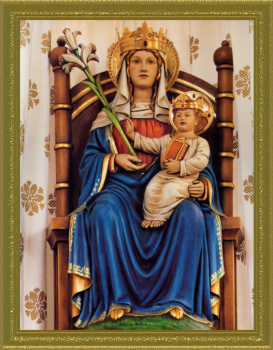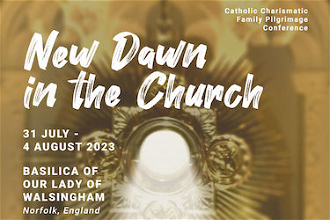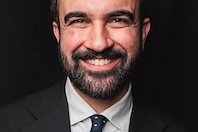Walsingham: Bishop Davies at New Dawn Conference

Source: Diocese of Shrewsbury
Most Rev Mark Davies, Bishop of Shrewsbury, gave this homily at the end of the New Dawn Charismatic Renewal Conference, in Walsingham, on Friday, 9 August.
A new dawn broke upon this world with the advent of Jesus Christ (Cf. Lk. 1:78). In the light of that dawn we see how every chapter of human history, every successive challenge to Christ and His Church are merely the last, fading shadows of the night. This Second Vatican Council recalled us to this Christian understanding of time teaching that, "Already the final age of the world is upon us, and the renewal of the world is irrevocably under way …" (Lumen Gentium 48:3). Cardinal John Henry Newman, a new Saint for our land - indeed, for the whole Church - drew from the Scriptures and his deep insight into the Church's long story the conviction that amid every crisis the faithful have only to stand firm and we will "see the salvation of God."
Yet, dark shadows remain in our day. At times they may even seem to be lengthening in British society, suffering as it does from amnesia (a loss of memory) of the Christian faith on which our society was built. This forgetfulness allows new ideological agendas to become the driving force of what is called 'human progress.' Yet, in reality it is the active discarding of the Christian moral inheritance whether in a radical assault upon the sanctity of human life or marriage itself as the foundation of the family; or upon human identity as it comes from the hand of the Creator.
Many people may momentarily be persuaded that humanity's inevitable path toward progress lies in this new order. Yet, our faith assures us that it is only a matter of time until all things, placed beneath His feet, are subject to Christ. This goal towards which all human history is moving and it inspires us to pray, above all, in the Holy Eucharist, Maranatha! Our Lord come! (Cf. Catechism of the Catholic Church n. 671).
The Catechism of the Catholic Church reminds us that this present time, marked by distress and the trial of evil which does not spare the Church, is also the moment of the Spirit and of our witness, a time of waiting and watchfulness in prayer (CCC n. 672). As all shadows give way to the light of dawn, Saint John Paul II, offered to the continent of Europe the luminous figure of Edith Stein as a witness and an intercessor in prayer. This woman, known as Sister Teresa Benedicta of the Cross, walked through the shadows of 20th Century. She journeyed from an intellectual atheism to the fulness of the Catholic faith. She embraced the hidden life of a Carmelite Sister and finally gave her life in the extermination camp of Aucswitz, the very place, where every one of the Ten Commandments of God were trampled upon, as Pope Benedict XVI once observed.
At the end of this New Dawn Conference, you are preparing to return to the place in life where you are now called to give your own witness. We might recall Saint Teresa Benedicta's last words written to the Prioress of her Carmelite Monastery. Written from the misery of the transit camp going East to Auschwitz, she scribbled a note which simply read, "So far, I have been able to pray gloriously." Amid some the darkest shadows of the past century, Edith Stein did not despair as she passed through a night in which everything Christianity brought to this continent was denied. She did not resign herself to this 'new world order' as the inevitable future. No, Edith was able to pray gloriously with the vision of that dawn which broke upon this world in Jesus Christ. And her unwavering faith and prayer gave her strength to assist those around her going into a deathly darkness.
In the Gospel, Jesus teaches this same lesson in parable of the wise and foolish bridesmaids, all of whom became drowsy and drifted into sleep during the long night watch, until they heard the cry, "Here is the bridegroom! Come out to meet him!" (Mt.25:6). Because they were not ready for this moment, the lights of the foolish bridesmaids were extinguished in the darkness. The inner resource of their prayer had faded. The wise bridesmaids had enough oil to keep their lamps burning through the deepest shadows of night. Our Lord uses this example to urge all who would follow Him to keep watch: "For you know neither the day nor the hour" (Mt. 25: 13).
We do know not know that moment when Christ will come at last "with power and great glory" yet that hour frames all time (Cf. Luke 21:28). Passing through these last shadows of night, we must with the Church be sure of that betrothal which the Prophet Hosea speaks. The promised union with the Bridegroom by which the faithful must put aside every false idol and ideology which momentarily enthrals whole generations. We so pledge ourselves for love of the Lord alone. In this way, we keep our night watch and the light of our witness burning by this interior union with the Lord in prayer and the Holy Eucharist.
The Blessed Virgin Mary has accompanied the Church and even appeared many times over the centuries, these apparitions belong to the charismatic life of the Church. In all of them, we hear her urgent call to prayer and to give the Holy Eucharist a central place in our lives. This call you have heard in Walsingham. It is the call which has made of all the Marian centres of pilgrimage places of unceasing prayer, Eucharistic celebration and adoration and therefore of New Evangelisation. In all these extraordinary places we meet the same Mother of Jesus, who in the pages of the Gospel, speaks few yet decisive words. In Walsingham, she invites us to enter into the joy of the Angelic salutation; in Lourdes, she asked Bernadette and the many millions who have been there since simply to join her in the silence of prayer.
Time will not allow us to continue this reflection, so let us note how that remarkable little book, "The Soul of the Apostolate" insists how all apostolic action and authentic Christian witness is the overflow of our interior life of prayer, of the Eucharistic life which flows ceaselessly from the Sacrifice and Sacrament of the Altar. In other words, we could never hope to sustain our own Christian witness unless we also sustain this interior life. This is the oil of our watchful prayer by which the light of Christ will continue to burn strongly in us. Abbot Chautard expressed this powerfully in 'The Soul of the Apostolate" so I have need only to repeat his words: "The apostolic flame has been passed on by Jesus to His Church, which is the gift of His love, which diffuses His life, manifests His truth, and shines with the splendour of His sanctity." The writer says you and I must seek to burn with this self-same love. For we could never hope to see a new evangelisation of British society merely by our own schemes and unaided efforts without becoming ever more deeply people of prayer, Eucharistic men and women.
I can never forget that, when asked how his parish was converted, the Cure of Ars pointed to the place where he knelt before the Tabernacle. That is surely where the new evangelisation of Europe began in such persevering prayer and ever-deepening Eucharistic adoration. As we go from this week of renewed prayer and deepened Eucharistic life, may we be renewed in this same conviction that our apostolic work and witness will be effective only insofar as we are united with the same Jesus Christ, He who brings the new dawn from on high and lives and reigns for ever and ever.


















